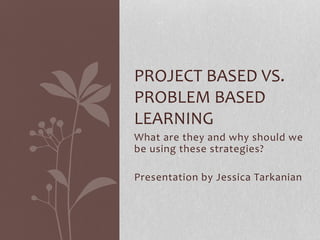
Engaging Learners with Project-Based and Problem-Based Learning Strategies
- 1. What are they and why should we be using these strategies? Presentation by Jessica Tarkanian PROJECT BASED VS. PROBLEM BASED LEARNING
- 2. PBL (project-based learning and problem-based learning) Why are they important for our learners? • Great strategies to engage students • Help students become critical thinkers • Develop 21st century skills
- 3. Problem-Based Learning • Problems are complex and open-ended • Students work in groups collaboratively to solve problems • Students use resources, including technology to work together to solve problems • Problems often incorporate real-life situations “Using real-life, multifaceted problems, allowing students to solve them, encouraging students to learn from failure, having fun, and providing collaboration time are interconnected strategies that can raise student expectations and better prepare them for the 21st century” (Gasser, 2011, p. 114-115).
- 4. Project-Based Learning Student led and teacher facilitated Students are driven by their natural curiosity According to Bell, (2010), project based learning is a strategy for creating independent thinkers and learners. Results in a product, a presentation, or a performance “Students drive their own learning through inquiry, as well as work collaboratively to research and create projects that reflect their knowledge” (Bell, 2010, p. 39).
- 5. Similarities • Both problem-based learning and project-based learning help students gain critical thinking • Problem and project based learning allow students to utilize classroom resources and technology • Problem and project based learning both require students to be motivated and self-directed • The teacher acts as facilitator in both project-based and problem- based learning.
- 6. Differences • Problem-based learning involves students working together to solve a problem. Usually problems are tied to real-life situations • In problem-based learning students do not choose their topics. • Project-based learning can be collaborative or individual. Students choose a topic that they are drawn to.
- 7. Benefits to PBL • Project and problem-based learning prepare students for a competitive job market. • Project-based and problem based learning require the use of 21st century skills like collaboration, critical thinking communication, and creativity. “In this process, students pursue solutions to open-ended problems by formulating questions for investigation; designing plans or proposals; collecting, analyzing, and integrating information; constructing explanations and models; and creating artifacts or products of their understanding” (Papanikolaou & Boubouka, 2010, p. 135).
- 8. Problem-based learning ideas • What are solutions to problems kids face today? -Childhood diabetes, childhood obesity • There are many endangered species in our state. What can we do to help solve the problem? At one school each grade level has three problem based learning units per year. Students work towards solving a real-world problem through deep research and investigation. Guest speakers come in, field trips are scheduled, and then students present their solutions to a panel of experts as the culmination of the unit.
- 9. Project-based learning • Project-based learning projects are different because they rely upon student interest: Question: Do a project where you find the volume of a specific object or design an object and find the volume. Brainstorming ideas: • Design your dream house. Find the volume of each room. • Design an aquarium. Find the volume of water needed to fill the tank. • Find the volume of the swimming pools at Pirate’s Cove fun center
- 10. Problem-based learning and project-based learning in your classroom • Project-based learning: start with a question and allow students to let interest drive learning. • Problem-based learning: Give students an open-ended and complex problem that they can solve. The problem can be real-life focused and offer a solution to a real world problem.
- 11. Collaboration Time • Meet with your grade level team and brainstorm Problem Based Learning ideas • Let problems stem from science and social studies standards. Literacy will seamlessly integrate. We will share ideas in 15 minutes
- 12. References: Bell, S. (2010). Project-based learning for the 21st century: Skills for the future. The Clearing House, 83(2), 39-43. Gasser, K. W. (2011). Five ideas for 21st century math classrooms. American Secondary Education, 39(3), 108-116. Papanikolaou, K., & Boubouka, M. (2010). Promoting collaboration in a project-based e-learning context. Journal Of Research On Technology In Education (International Society For Technology in Education), 43(2), 135-155.
